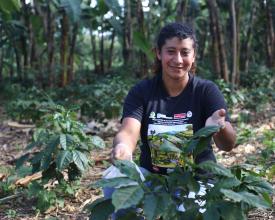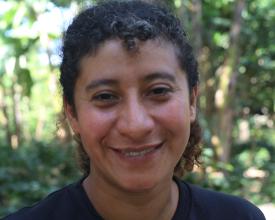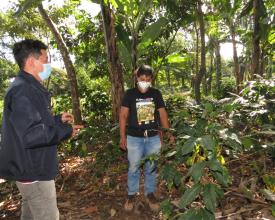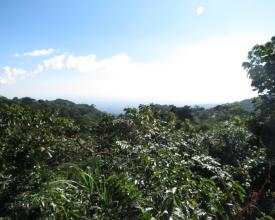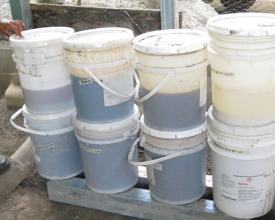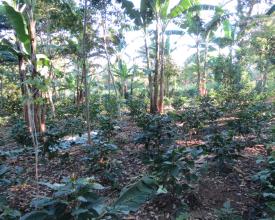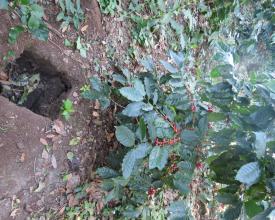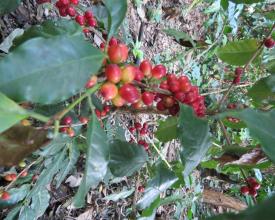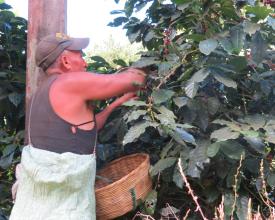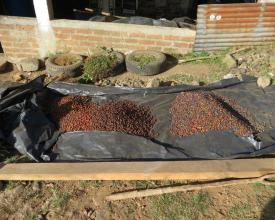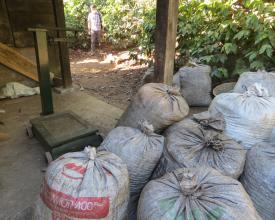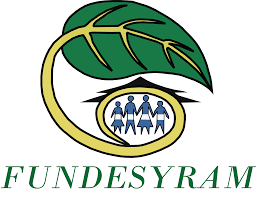
Promoting the coffee value chain in small producers through agroecology and its diversification.

Shade-grown coffee represents more than 66% of the Apaneca-Ilamatepec Biosphere Reserve in El Salvador, which interconnects and enables the flow of flora and fauna species. However, this crop faces two major threats: the first is the elimination of coffee plantations due to land use changes for urbanization, and the second is the replacement of coffee plantations with basic grains and vegetable crops.
In this regard, the Green Development Fund project in the SICA region of El Salvador called "Leveraging farms with agroecological management of the coffee agroecosystem in the Apaneca-Ilamatepec Biosphere Reserve" worked with 50 producers to restore ecosystems and landscapes through agroecological and diversified coffee production. This allowed them to improve their income thanks to new products and the added value provided by agroecological coffee management, strengthening the marketing chain of products associated with the crop.
Contexte
Défis à relever
Environmentally:
- Protect the Apaneca-Ilamatepec Biosphere Reserve for its high biodiversity and the environmental services generated there.
- Reduce the transformation of the coffee forest due to land use changes.
Socially:
- Strengthen the associativity of producers as a collective collaboration strategy to link to marketing and distribution networks on a local scale.
- Reduce the rate of unemployment and emigration due to the abandonment of coffee plantations.
Economically:
- Create profitable value chains within coffee cultivation through agroecological management of the farm and diversification with fruit and forest trees. With this, the objective is to create additional income to absorb the costs of renovating the coffee plantation, reduce the costs associated with the management of the farm (including the purchase of synthetic inputs) so that the producer has the working capital necessary to maintain and expand the agroforestry system.
Emplacement
Traiter
Résumé du processus
In the Apaneca-Ilamatepec Biosphere Reserve, activities were promoted to revalue coffee (BB2), both economically and environmentally, diversifying coffee cultivation (BB1) through the incorporation of fruit and forest trees and thus generating additional income for the producer (BB1 and 2). The key to developing this component was capacity building from theory to practice for the management of the coffee agroforestry system (BB1), as well as the introduction of agroecological practices to add value to the crop and make it more environmentally friendly (BB2). Finally, the project established links with fair markets related to the value chain of the coffee agrosystem and agroecological tourism in the Apaneca-Ilamatepec Biosphere Reserve. At the same time, working synergies were achieved with other initiatives in the territory that have allowed for the continuity of the project's actions through the insertion of beneficiaries in the commercialization link of the production chain (BB3).
Blocs de construction
Diversifying coffee: from theory to practice
Building Block 1 (BB1) promotes agroecology as the main model for technical assistance, to strengthen the relationship between the farmer and his/her livelihoods, so that agricultural systems are transformed to achieve environmental and productive sustainability. BB1 is carried out through capacity building of "learning-by-doing" with the farmer to adopt new agroecological practices in the management of his/her farm.
In the Apaneca-Ilamatepec Biosphere Reserve, activities were promoted to revalue coffee (BB2) and reduce the loss of forest cover in the territory, which is why the development of theoretical and practical training sessions, including exchanges of experiences among producers, was key to developing this BB1. Finally, the project established links with fair markets related to the value chain of the coffee agrosystem and agroecological tourism in the Apaneca-Ilamatepec Biosphere Reserve. At the same time, working synergies were achieved with other initiatives in the territory that have allowed for the continuity of the project's actions through the insertion of beneficiaries in the marketing link of the production chain (BB3).
Facteurs favorables
For the success of this Building Block it was favorable to have:
- An experienced entity located in the project intervention area, which allowed for technical assistance to the beneficiaries.
- FUNDESYRAM's commitment to the long-term sustainability of the actions in the territory.
- The agroecological model allows easy local assimilation for different types of agricultural systems found in Central America.
Leçon apprise
- Define an attainable number of beneficiaries that will allow timely follow-up and monitoring of actions to provide the technical assistance required to ensure compliance with the expected quality in the field.
- Identify people with community leadership to promote and encourage the good practices acquired in the project with other producers.
Revaluation of coffee with Agroecology
Building Block 2 (BB2) focuses on revaluing coffee, due to the fact that coffee prices fluctuate in the international market, making it difficult for small coffee growers who historically grow coffee on leased or owned land, and when there is no evidence of profit, they sell the land or change the crop, which modifies the soil and strips it of vegetation. In other scenarios, the land is used for urbanization, modifying the landscape, endangering wildlife and reducing ecosystem services.
The first step implemented was to change the traditional production approach towards an agroecological management that creates additional income within the farm, with differentiating elements for the consumer. Some of the practices implemented were: infiltration pits, cyclical crop renewal, soil protection with organic matter, diversified shade through the incorporation of fruit or forest trees, among others.
The second step was to strengthen the associativity of small coffee growers through local governance platforms, and to establish links with fair trade businesses that improve income from the sale of coffee and reduce processing costs.
Facteurs favorables
For the success of this Building Block it was favorable to have:
- Community interest in strengthening the coffee value chain under agroforestry management that is linked to the socio-economic activities of the territory, and in turn, allows for the restoration of ecosystem services.
- To approach coffee beneficiaries in the territory to contribute to sustainable development by linking them with small coffee growers.
- Beneficiaries with adaptability to changes in the production system.
Leçon apprise
- Analyze and prioritize during planning the relationship between small producers, local platforms and cooperatives or private companies that can promote interest and sustainability within the coffee value chain in the territory.
- An assessment should be carried out together with the producer on the most suitable agroforestry system with an exit strategy so that technical assistance is gradually reduced.
Linkage to fair markets and synergies
Building Block 3 (BB3) was based on establishing links with fair trade for small coffee growers, inserting them in training programs and permanent training in coffee growing and environmental education, and guaranteeing them technical assistance from local cooperatives and coffee beneficiaries.
Given that the territory is recognized as a tourist destination, the opportunity to strengthen the agrotourism value chain between coffee and tourism was promoted so that the farms could be planned and managed for this purpose, thus diversifying and increasing income.
On the other hand, synergies were identified with other initiatives and private organizations to continue working with the people benefited by the project, in order to take advantage of the leadership and awareness to expand the restoration actions, replicate the knowledge acquired and insert the beneficiaries in the commercialization link of the production chain.
Facteurs favorables
For the success of this Building Block it was favorable to have:
- The project intervention territory has previous experiences of successful ventures that are positioning the coffee sector linked to ecotourism, which generated ease in making approaches with the private sector and with the beneficiaries of the project, since there is knowledge of the social, environmental and economic impacts that this generates.
Leçon apprise
- In order for the project to be successful, it is necessary to take up local planning instruments during project planning, which synthesizes the interests of the territory and allows for a clearer analysis of the actors involved and the challenges of the project.
- It is recommended to actively involve the private sector for the sustainability of the actions.
- It is essential to understand the context of the territory in order to successfully articulate the efforts related to the value chains that can be implemented.
Impacts
- Positive productive changes at the farm level as strategies for climate change adaptation, such as crop diversification and agroecological management.
- Implementation of production alternatives that generate additional income.
- Creation of alliances with private enterprises to guarantee the incorporation of beneficiaries in the different links of the coffee value chain.
- Capacity building on management, conservation and rapid response to drastic climatic events.
- Increased practices to guarantee the availability and supply of water on the farms.
- Strengthening the actions of the Local Sustainable Development Plan for the Apaneca-Ilamatepec Biosphere Reserve.
- Leveraging more than 600 hectares with an agroecological approach to the coffee agrosystem.
- Strengthening and linking coffee and ecotourism value chains.
- Valorization of the ecosystem benefits of the Apaneca-Illamatepec Biosphere Reserve.
-
Estimated contribution of 124,338 tons/year of CO2 capture.
-
Estimated water infiltration of 937,948,767 m³.
-
50 direct beneficiaries who implement the project.
-
2,500 indirect beneficiaries as workers, processors and marketers of coffee and fruit trees.
-
Generation of 15 to 20 direct jobs in some farms, counteracting the negative environment of the COVID-19 pandemic.
Bénéficiaires
Small producers that can be linked to the commercialization link of the coffee value chain through the diversification of the agroforestry system.
Objectifs de développement durable
Histoire
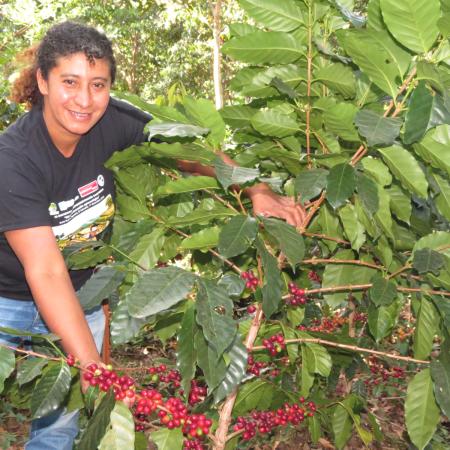
Marina del Rosario Lima known as "niña Marina" is an enterprising woman, mother of two children, community extensionist of the Mayor's Office of Atiquizaya and owner of 3 hectares of land located in the Santa Rita canton of the municipality of Atiquizaya, department of Ahuachapán.
Marina is one of the 50 producers who led the actions of the project "Leveraging farms with agroecological management of the coffee agroecosystem in the Apaneca-Ilamatepec Biosphere Reserve" in El Salvador. This initiative provided her with technical assistance that allowed her to expand, improve and diversify her coffee crop through the management of organic inputs, the establishment and strengthening of living barriers, the incorporation of fruit and forest trees that will generate additional income for the producer, as well as the implementation of water infiltration basins for the agrosystem.
Through the project, Marina assures that the following benefits have been obtained: increased profitability of the harvest, economic improvement in the family and the community, reduction of carbon dioxide with the trees and support in the conservation of fauna and flora, serving as a passageway for many animals.
According to FUNDESYRAM estimates, the contribution of CO2 capture for the areas intervened by the project is 124,338 tons/year; while water infiltration has been calculated at 937,948,767 m³. The project also reached 2,500 indirect beneficiaries such as workers, processors and marketers of coffee and fruit trees.
In addition, the project's actions were opportune to counteract the negative environment generated by the COVID-19 pandemic, by motivating producers of the coffee agrosystem to promote actions that benefited the families living in and around the farms, generating continuity between 15 to 20 direct jobs in the larger farms.
To guarantee sustainability, fair trade spaces were identified and used to ensure the economic autonomy of producers and families participating in the project, such as: short chain circuits, positioning of the brand of origin, direct commercialization, among other aspects. Similarly, the project's actions were linked to initiatives being implemented in the territory.

